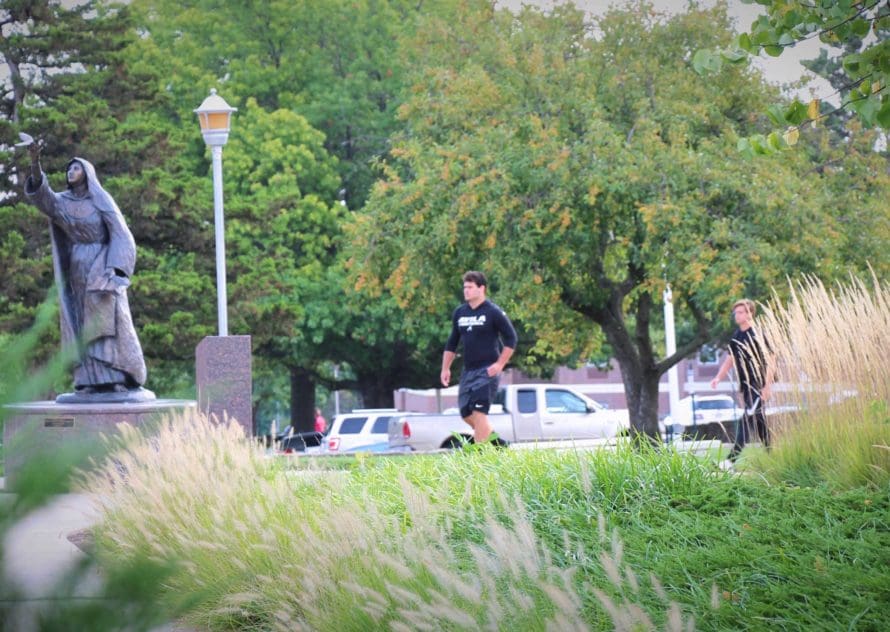
Contact
Leslie Dorrough Smith, Ph.D., Dean of Arts and Sciences Professor of Religious Studies; Chair of the Women’s and Gender Studies Program
P: 816-501-3655 / E: leslie.smith
Courses
The minor requires eighteen hours in Women’s and Gender Studies courses, including PL 326 and IS/WS 210. Students choose the remaining 12 hours of WS courses with the advisor’s approval. No more than six hours may be earned from the same discipline, and at least six hours of the minor must be taken at the 300 or above level.
- WS/RS 111 Introduction to Religious Studies (3)
- WS/IS 210 Images and Realities of Gender (3)
- WS/PY 214 Psychology of Gender (3)
- WS/MU 221 Divas, Ingénues and Vixens (3)
- WS/EN 275 Women and Literature (3)
- WS/EN 278 Global Literary Perspectives (3)
- WS /CO 283 Gender and the Media (3)
- WS/HI 311 American Women in the 20th Century (3)
- WS/AN 318 Women in Other Cultures (3)
- WS/IS/RS 319 Women, Religion and Community in the U.S. (3)
- WS/PL 326 Feminist Theory
- WS/IS 331 Women and Science (3)
- WS/IS 333 Gender Communications (3)
- WS 335 Legal Rights of Women (3)
- WS/HI 370 Fairy Tales and Culture (3)
- WS//IS/PL 372 Being Together. Gender, Race, and Class in Global Context (3)
- WS 380 Topics in Women’s Studies (1-3)
- WS/EN 462 Rhetoric of Women (3)
What is Women’s & Gender Studies?
Women’s and Gender Studies is an interdisciplinary program that aims to build an awareness of the multitude of ways in which bodies and identities are culturally constructed. While many of our individual courses deal directly with women and gender, they are more largely concerned with considering and questioning the ways in which sex, gender, race, class, sexualities (and a host of other identity categories) have been used as mechanisms of both oppression and empowerment within and against certain populations. Taught from a feminist theoretical perspective and open to all students, Women’s and Gender Studies courses are designed to give students the tools to engage their critical thinking skills, to enable them to dissect the mechanisms of power that are central to culture, and to understand and challenge the worlds in which they live.
What can I do with a Women’s & Gender Studies Minor?
A Women’s and Gender Studies minor is a great fit for almost every major that Avila offers. One reason is that it offers the best of a liberal arts education: it teaches students how to read and write carefully, how to analyze, and how to engage in critical thought. Yet Women’s and Gender Studies deals with far more than just these important skills. Women’s and Gender Studies students understand the role that sex, gender, race, and class play in society. They are able to recognize bias and oppression, to talk about the nature of the power relationships within society, and to critically analyze trends in our culture. Because of this ability to engage in critical social thought and their ability to value diversity, many employers are enthusiastic about applicants who hold a Women’s and Gender Studies minor.
The Women’s and Gender Studies minor is an 18-hour minor. PL 326 and IS/WS 210 are the only required courses for the minor; the remaining 12 hours should be chosen from WGS courses with the advisor’s approval. No more than six hours may be earned from the same discipline, and at least six hours of the minor must be taken at the 300 or above level. No major is currently offered.
Course Descriptions
WS/RS 111. Introduction to Religious Studies. (3)
A critical examination of religion as a human endeavor through examinations of different religious perspectives from historical, anthropological, and/or sociological standpoints. Through the academic study of religion, students will become conversant with major themes, issues, figures, and phenomena. CORE-II.
WS/IS 210. Images and Realities of Gender. (3)
This course will examine the social construction and significance of gender in society from feminist, interdisciplinary, and multicultural perspectives. Students will analyze the ways that gender, (in combination with race, sexual identity, and social class) affects access to opportunity, power, and resources. CORE-III.
WS/PY/ 214. Psychology of Gender. (3)
An exploration of various perspectives on the role of gender in the formation of individual identity, as well as the interrelationship between gender identity and society. FA, odd years.
WS/MU 221. Divas, Ingénues and Vixens. (3)
A study of folk, popular, and refined music from the Western tradition specifically analyzing the compositions, performances, and role of women in music and applying feminist perspectives. Comparative elements such as ethnomusicology and male musicians will be utilized to provide a framework for the music of women. No prerequisite. CORE-II. SP.
WS/EN 275. Women and Literature. (3)
An introduction to a wide range of women’s experiences as represented in World Literature. In discussing women as authors, literary characters, and social and political subjects, students examine reading practices and analyze how gender differences interact with differences of race, class, sexual orientation, and nation. This is a Communication Intensive course. CORE II. FA.
WS/EN 278. Global Literary Perspectives. (3)
Through the lens of literature, this course explores the flows of people and their culture and labor across borders. Each text is examined in terms of its artistic and political dimensions with a focus on identity, gender politics, and historical revision. Rather than discrete nations and single cultures, the course concentrates on movement, hybridity, and multiplicity. In addition to physical movement, the course examines other possessions that move across the borders including information, language, traditions, and beliefs, examining ways in which people remember, reimagine, and reshape their sense of self and community. Prerequisite: EN 111. PRE-2015 CORE: Level II. 2015 CORE: Social Justice & Civic Life, Acquire, Global Studies. FA, SP.
WS/CO 283. Gender and the Media. (3)
A critical/cultural approach will provide a framework for understanding how gender, class, and race influence the production, construction, and consumption of the media.
WS/HI 311. American Women. (3)
An investigation of women’s experiences as workers, family members, and citizens in twentieth-century America, this course explores changing cultural images of women, examines the role of gender in structuring American society, and compares the experiences of American women from a variety of class, race, and ethnic groups. This course also considers ways in which women’s status and concerns in the United States differ from those of women in the non-Western world.
WS/AN 318. Women in Other Cultures. (3)
A cross-cultural study of women’s status and roles in selected ethnic or cultural groups in differing stages of development, including forager, agrarian, industrial, and post-industrial societies. FA, even years.
WS/IS/RS 319. Women, Religion and Community in the U.S. (3)
This course will examine women and religion and how the interaction of religious and gender ideology helped shape experiences and create women’s communities within a variety of religious traditions in the U.S. We will view the religious experience through a multicultural lens which includes the perspectives of African-American, Native American, Jewish, Catholic, and Protestant women and some women founders of American and international religious groups. CORE III.
WS/PL 326. Feminist Theory. (3)
This course provides an introduction to feminist theoretical methods through an examination of some of the basic categories of feminist analysis, including identities, bodies, rights, politics, sexuality, and reproduction, among others. We will consider what role these categories and their construction play in creating gendered experiences within the culture. CORE-II.
WS/IS 331. Women and Science. (3)
This course introduces students to the complex relationship between women and science, beginning with representations of female biology in Greek texts. Students examine both general nineteenth and twentieth-century patterns and trends and the achievements of individual women scientists. Students analyze persistent barriers to women’s participation and advancement and the methods employed to overcome such barriers. The course includes an analysis of sexist content in the sciences and the impact of feminist critiques. CORE-III.
WS/IS 333. Gender Communications. (3)
A critical analysis of the interrelationship between gender, culture, and communication. Gender differences and sex-role stereotypes and their influence on communication and relationships will be explored so that strategies for bridging these differences can be developed. Core- III. SP.
WS 335. Legal Rights of Women. (3)
This course is designed to introduce students to feminist jurisprudence and the role of women in the law through an examination of feminist legal and political theory. We explore the ways in which traditional gender roles and expectations have come to shape women’s rights in both criminal and civil law. Students will come to understand and appreciate the history of women’s unequal treatment in law, as well as contemporary issues regarding women and the law. Topics include reproductive rights, statutory rape, domestic violence, pornography, and issues involving work outside the home. Attention is paid to the ways in which traditional norms involving race, class, and gender are reinforced in popular culture, which often serves as a barrier to meaningful change. SP, even years.
WS/HI 370. Fairy Tales and Culture. (3)
This course is an exploration of the creation, transmission, and implications of culture to power relations (particularly gender) of fairy tales in modern world history since 1450 C.E. in a global context. Meets both the upper-division requirement for World history and communication-intensive requirement in the history major.
WS/IS/PL 372 Being Together: Gender, Race, and Class in Global Context. (3)
This interdisciplinary course will serve to introduce the student to think about what it means to exist together, with other human beings, in the midst of a ‘global’ world, especially as that concept is navigated by means of gender, racial, class, and other differences. We will consider both the genesis of these categories, and also how best to understand them, and we will do so largely by recognizing that they are influenced or determined by other categories, like, for example, power and desire. In this way, the course will consider both the most basic philosophical issues involved in existing with others (recognition, acknowledgment, and inter-subjectivity, as well as their failures) as well as the more specific ways in which we come to relate to and identify ourselves, and each other (gender, race, class, and others). We will conclude the course by exploring issues of justice in light of a global context and of our explorations throughout the semester.
WS 380. Topics in Women’s Studies. (1-3)
Special topics in women’s studies are explored from a variety of academic disciplines. Course topics are determined based on faculty/student interest and program needs. Prerequisite: Permission of Instructor
WS/EN 462 Rhetoric of Women. (3)
Using gender as a category of rhetorical study, this course locates and listens to rhetoric by and about women. Students will study diverse rhetorics produced by women as well as general feminist rhetorics.
Visit Avila
Interested in learning more about Avila? We would love to host you for a campus visit. Learn more about individual and group visit opportunities.
Plan a Visit


